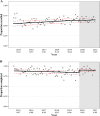Enrollment and completion rates of a nationwide guided digital parenting program for children with disruptive behavior before and during COVID-19
- PMID: 39141106
- PMCID: PMC11868137
- DOI: 10.1007/s00787-024-02523-6
Enrollment and completion rates of a nationwide guided digital parenting program for children with disruptive behavior before and during COVID-19
Abstract
Our aim was to study enrollment and completion levels for the internet-based and telephone-assisted Finnish Strongest Families Smart Website (SFSW) parent training intervention, for parents of young children with disruptive behavior before and after the COVID-19 lockdown period. Population-based screening was carried out on 39,251 children during routine check- ups at 4 years of age. The parents of children scoring at least 5 on the Strengths and Difficulties Questionnaire were assessed against inclusion and exclusion criteria. Associations with enrollment or completion were analyzed using logistic regression models. The effects of COVID-19 restrictions on these were estimated using interrupted timeseries analysis. Of 39,251 families, 4894 screened positive and met the eligibility criteria. Of those, 3068 (62.6%) decided to enroll in the SFSW program and 2672 (87.1%) of those families completed it. The highest level of disruptive behavior (OR 1.33, 95% CI 1.12-1.57, p < 0.001) and overall severity of difficulties (OR 2.22, 95% CI 1.91-2.57, p < 0.001) were independently associated with enrollment. Higher parental education was associated with enrollment and completion. Higher paternal age was associated with enrollment, and parent depressive symptoms with non-completion. The SFSW enrollment did not significantly change following the COVID-19 restrictions, while the completion rate increased (COVID-19 completion OR 1.75, 95% CI 1.22-2.50, p = 0.002). Guided digital parenting interventions increase the sustainability of services, by addressing the child mental health treatment gap and ensuring service consistency during crisis situations.
Keywords: COVID-19 pandemic; Internet-based intervention; Mental health; Parenting; Public health.
© 2024. The Author(s).
Conflict of interest statement
Declarations. Conflict of interest: Dr. Sourander is the founder and director of Digifamilies, which provides evidence-based treatments to Finnish public health services. The authors declare no other conflicts of interest. All authors read and approved the final manuscript.
Figures


Similar articles
-
Internet-Assisted Parent Training Intervention for Disruptive Behavior in 4-Year-Old Children: A Randomized Clinical Trial.JAMA Psychiatry. 2016 Apr;73(4):378-87. doi: 10.1001/jamapsychiatry.2015.3411. JAMA Psychiatry. 2016. PMID: 26913614 Clinical Trial.
-
Effectiveness of an Internet-Based and Telephone-Assisted Training for Parents of 4-Year-Old Children With Disruptive Behavior: Implementation Research.J Med Internet Res. 2022 Apr 4;24(4):e27900. doi: 10.2196/27900. J Med Internet Res. 2022. PMID: 35377332 Free PMC article. Clinical Trial.
-
Cost-Effectiveness of Digital Preventive Parent Training for Early Childhood Disruptive Behaviour.J Ment Health Policy Econ. 2024 Sep 1;27(3):85-98. J Ment Health Policy Econ. 2024. PMID: 39290059 Clinical Trial.
-
[Intrafamilial disruptive behaviour disorders in children and adolescents: Present data and treatment prospects].Encephale. 2018 Apr;44(2):176-182. doi: 10.1016/j.encep.2017.09.002. Epub 2017 Nov 17. Encephale. 2018. PMID: 29153459 Review. French.
-
Content analysis of parent training programs for children with neurodisabilities and mental health or behavioral problems: a scoping review.Disabil Rehabil. 2023 Jan;45(1):154-169. doi: 10.1080/09638288.2021.2017493. Epub 2022 Jan 6. Disabil Rehabil. 2023. PMID: 34990567
References
-
- Kazdin AE (2017) Addressing the treatment gap: a key challenge for extending evidence-based psychosocial interventions. Behav Res Ther 88:7–18. 10.1016/j.brat.2016.06.004 - PubMed
-
- Burkey MD, Hosein M, Morton I et al (2018) Psychosocial interventions for disruptive behaviour problems in children in low- and middle-income countries: a systematic review and meta-analysis. J Child Psychol Psychiatry 59:982–993. 10.1111/jcpp.12894 - PubMed
-
- Sourander A, McGrath PJ, Ristkari T et al (2016) Internet-assisted parent training intervention for disruptive behavior in 4-year-old children: a randomized clinical trial. JAMA Psychiat 73:378. 10.1001/jamapsychiatry.2015.3411 - PubMed
-
- Sourander A, McGrath PJ, Ristkari T et al (2018) Two-year follow-up of internet and telephone assisted parent training for disruptive behavior at age 4. J Am Acad Child Adolesc Psychiatry 57:658-668.e1. 10.1016/j.jaac.2018.07.001 - PubMed
MeSH terms
Grants and funding
LinkOut - more resources
Full Text Sources
Medical
Miscellaneous

